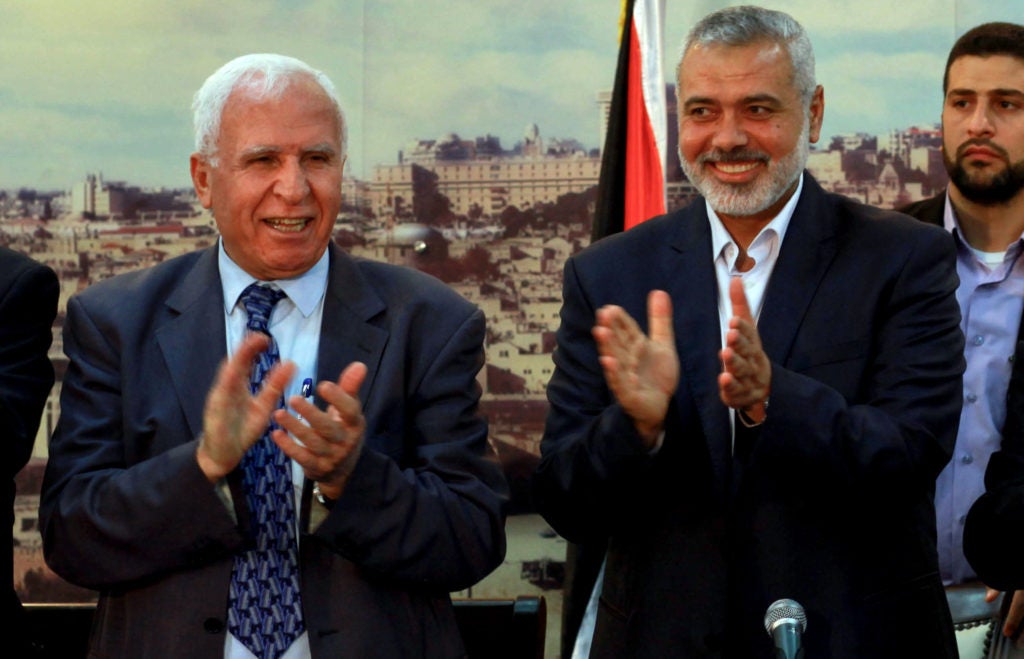Obama pointing finger at ‘both sides’ for peace impasse
Published April 25, 2014

Palestinian Fatah delegation chief Azzam al-Ahmed (L) celebrates with Hamas prime minister in the Gaza Strip Ismail Haniya in Gaza City on April 23, 2014 after West Bank and Gaza Strip leaders agreed to form a unity government within five weeks. (Abed Rahim Khatib/Flash90)
ADVERTISEMENT
WASHINGTON (JTA) — A pox on both your houses, but when you want a cure, we’re still here.
That is the message the Obama administration is sending Israel and the Palestinians amid the deepening crisis in peace efforts.
“What we haven’t seen is, frankly, the kind of political will to actually make tough decisions. And that’s been true on both sides,” Obama said Friday from South Korea.
The president’s remarks followed Israel’s suspension of talks this week in response to a governance deal between the Palestine Liberation Organization and Hamas.
Obama suggested that the peace process may have to be paused. But he also vowed that the United States was still ready to help the parties move toward peace.
“There may come a point at which there just needs to be a pause and both sides need to look at the alternatives,” he said.
A moment later, though, he suggested that there was no alternative to returning eventually to the negotiating table.
ADVERTISEMENT
“Realistically, there’s one door, and that is the two parties getting together and making some very difficult political compromises in order to secure the future of both Israelis and Palestinians for future generations,” he said. “Do I expect that they will walk through that door next week, next month, or even in the course of the next six months? No. Are we going to continue to try to offer constructive approaches that could lead them to go ahead and take those steps? Absolutely.”
State Department spokeswoman Jen Psaki told reporters that the U.S. team managing the peace talks remained on the ground and in touch with the parties.
The crisis began March 29, when Israel did not make a scheduled release of 26 Palestinian prisoners it had pledged to free. Within days the Palestinians violated their own pledge not to apply to join international agreements while talks were underway.
The crisis deepened Wednesday when Fatah reached a governance agreement with Hamas, which is considered a terrorist group by Israel, the United States and many other Western nations. Israel then suspended the talks formally on Thursday.
Israeli Prime Minister Benjamin Netanyahu explained that the governance deal with Hamas being pursued by Palestinian Authority President Mahmoud Abbas was incompatible with continued peace talks. “Does he want peace with Hamas or peace with Israel?” Netanyahu asked.
The Obama administration criticized the Palestinian unity deal because of Hamas’ refusal to embrace key principles underlying the peace process, including recognizing Israel, renouncing violence and agreeing to abide by past agreements.
“We all understand it’s hard to see how Israel can be expected to negotiate with a government that does not believe in its right to exist,” Psaki said Wednesday.
But Psaki’s shifted within 24 hours from putting the onus on the Palestinians to rhetoric more reflective of Obama’s current posture, which blamed both sides for the collapse.
“If we look back at the last several months, over the course of nine months even, there are unhelpful steps that have been taken by both parties,” she said Thursday.
In a statement, the Palestine Liberation Organization office in Washington emphasized that the agreement set up an interim government ahead of planned elections for the Palestinian presidency and parliament. It said the government’s ministers would be politically independent of both Hamas and Abbas’ Fatah faction.
“The PLO will continue negotiating a peace agreement with Israel, supporting non-violence to end the occupation and upholding previous agreements signed with Israel,” it said. “The interim government will adhere to those commitments and the PLO’s political agenda.”
Top lawmakers of both parties in Congress, however, blamed the Palestinians. Rep. Nita Lowey (D-N.Y.), the top Democrat on the U.S. House of Representatives Appropriations Committee, said she would initiate steps to defund the Palestinian Authority once Congress returns from its recess on Monday.
The only thing that would stop her from taking steps to defund the Palestinian Authority would be if Abbas were to reverse course on the agreement with Hamas, she said.
“At this point the law is clear, their actions are clear and the path forward is clear,” Lowey told JTA.
Psaki said it was too early to determine whether the agreement necessitated a cutoff in aid according to U.S. law, which bans the delivery of U.S. funds to designated terrorist groups.
Echoing Lowey’s call for a cutoff was Rep. Ileana Ros-Lehtinen (R-Fla.), the chairwoman of the House Middle East subcommittee who authored the 2006 law that bans funding to Hamas.
“Secretary Kerry must make Abu Mazen understand in no uncertain terms that opening up the Palestinian Authority to include Hamas will trigger the cutting off of all U.S. assistance to it,” she said, referring to Abbas by his nom de guerre.
Other influential lawmakers, including Rep. Kay Granger (R-Texas), the chairwoman of the Appropriations Committee’s foreign operations subcommittee, said that at the very least, the agreement jeopardized funding for the Palestinian Authority.
“This is an irresponsible path forward and this agreement should be abandoned immediately if the Palestinian Authority is serious about the peace process,” she said in a statement.
Rep. Eliot Engel (D-N.Y.), the top Democrat on the House Foreign Affairs Committee, told JTA that the composition of the government would be key to determining whether the approximately $400 million in U.S. aid to the Palestinians is cut.
“Will it be a Hamas-dominated government or a Fatah-dominated government with a couple of Hamas ministers?” he asked. “We have to make a judgment.”
![]()














